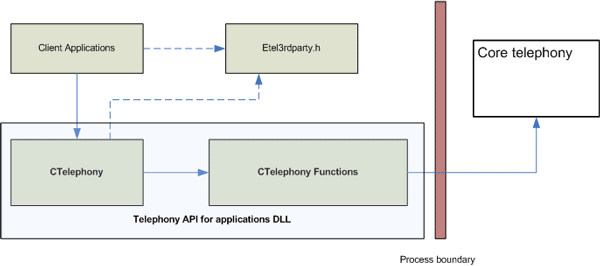Architecture
This section describes the architectural relationships of the telephony API for applications.
The telephony API for applications provides access to the basic telephony functionality for applications. The telephony API for applications is a subset of the multimode telephony API that provides a rich set of telephony applications to the handset manufacturers.
Overview
The API is implemented as static linked
library etel3rdparty.dll. The library must be linked
in the client applications to access the telephony functions. The client applications
access the functions with the CTelephony class.

Figure: Telephony API for Applications - Block Diagram
Description
The CTelephony class
provides a limited set of telephony functions to client applications. The CTelephony is built on top of the core, multimode
and packet data telephony APIs. The CTelephony class
provides client applications with the functions to :
dial a call
answer a call
get the capabilities of the line, the call and the network
get information about the basic and supplementary services of the network
The CTelephony class translates
the client API request into the internal commands and forwards them to the
telephony server. The telephony server forwards the command requests to the
telephony server plug-in (TSY). The TSY is developed and customised by the
handset manufacturers. The telephony functions available to client applications
depend on the functions implemented in the TSY.
Platform security
The DLL for the telephony API
for applications, etel3rdparty.dll is protected with the ALL
-TCB capability. According to the Symbian Platform
security model the client applications must have the minimum capability
of ALL -TCB to use the DLL.